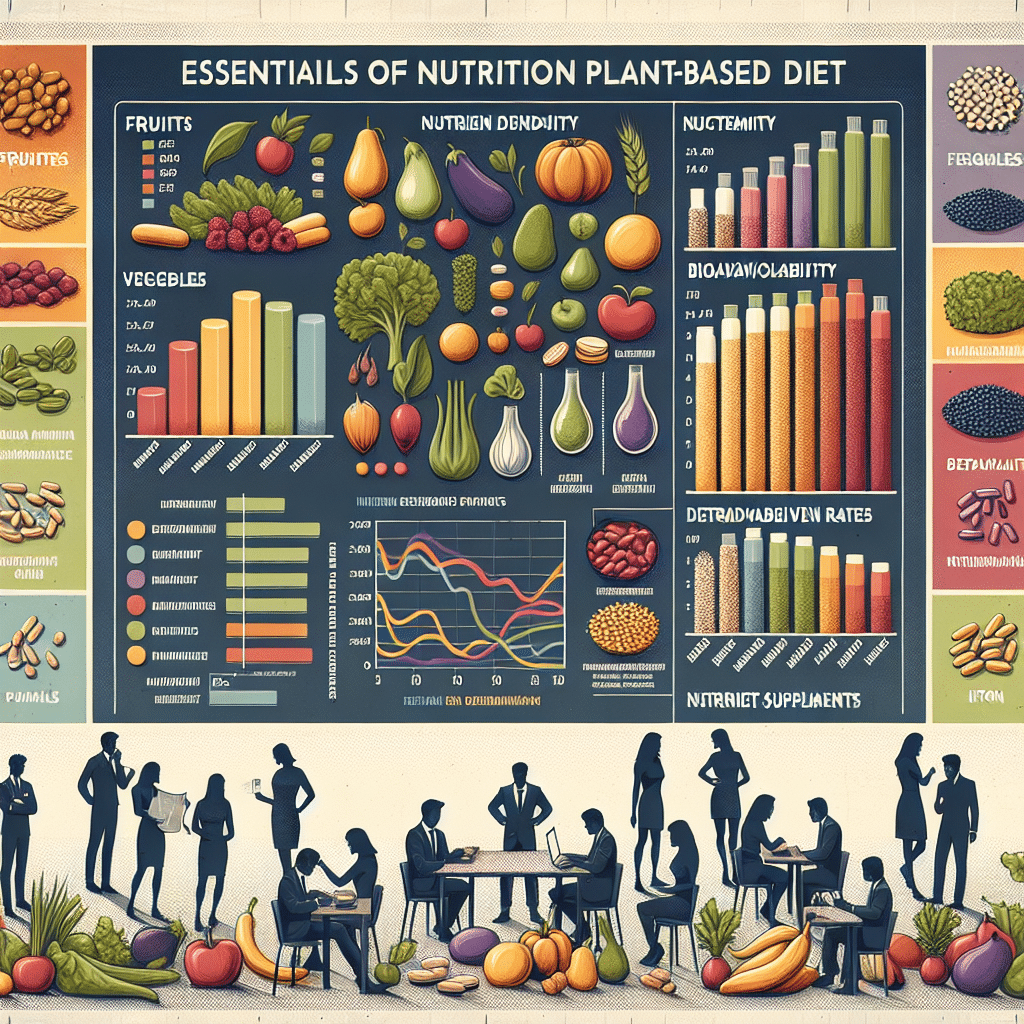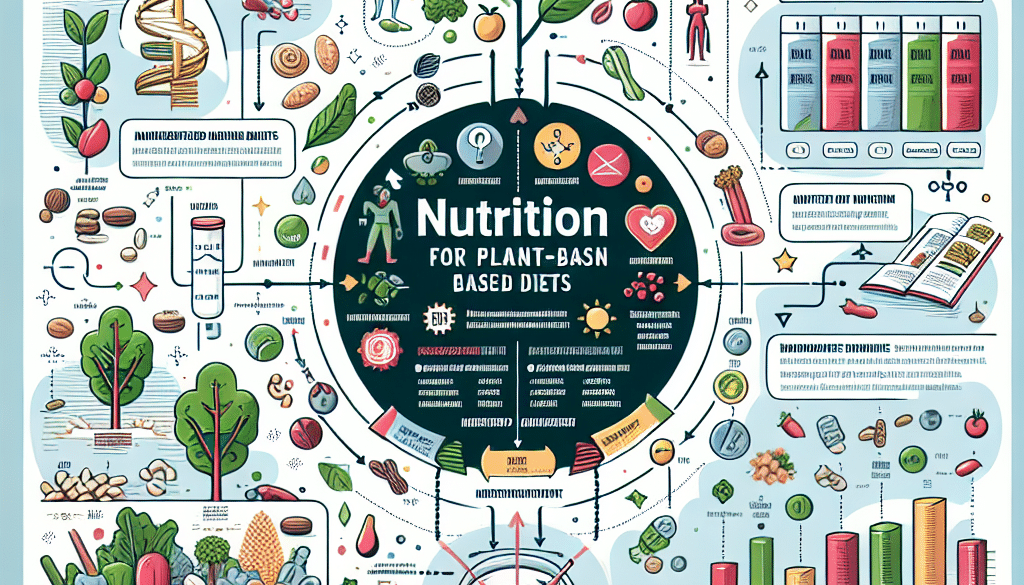Nutrition for Plant-based Diets: Managing Nutrient Intake and Bioavailability
-
Table of Contents
- Nutrition for Plant-Based Diets: Ensuring Adequate Nutrient Intake
- Understanding Nutrient Bioavailability in Plant-Based Diets
- Key Nutrients to Focus On
- Vitamin B12: The Plant-Based Challenge
- Iron: Combating Absorption Issues
- Calcium: Plant-Based Sources and Absorption
- Zinc: Ensuring Adequate Intake
- Omega-3 Fatty Acids: Plant-Based Options
- Protein: Combining Sources for a Complete Profile
- Vitamin D: Sun Exposure and Supplementation
- Iodine: A Trace Element with Big Impact
- Strategies for Maximizing Nutrient Bioavailability
- Conclusion: Balancing a Plant-Based Diet for Optimal Health
- Enhance Your Plant-Based Nutrition with ETprotein Products
Nutrition for Plant-Based Diets: Ensuring Adequate Nutrient Intake

Adopting a plant-based diet can offer numerous health benefits, including a lower risk of heart disease, hypertension, type 2 diabetes, and certain types of cancer. However, ensuring adequate nutrient intake and bioavailability is crucial for those who choose to eliminate or minimize animal products in their diet. This article delves into the essential nutrients that require attention in plant-based diets and offers strategies to maximize their absorption.
Understanding Nutrient Bioavailability in Plant-Based Diets
Nutrient bioavailability refers to the proportion of a nutrient that is absorbed from the diet and used for normal body functions. In plant-based diets, certain nutrients may be less bioavailable due to the presence of natural compounds that can inhibit their absorption. It’s important to understand these interactions to optimize nutrient intake.
Key Nutrients to Focus On
When following a plant-based diet, particular attention should be paid to the following nutrients:
- Vitamin B12
- Iron
- Calcium
- Zinc
- Omega-3 fatty acids
- Protein
- Vitamin D
- Iodine
Vitamin B12: The Plant-Based Challenge
Vitamin B12 is naturally found in animal products, and its deficiency can lead to anemia and neurological issues. Plant-based sources of B12 are limited, but fortified foods and supplements can help bridge the gap. Nutritional yeast, fortified plant milks, and breakfast cereals are good options for vegans and vegetarians.
Iron: Combating Absorption Issues
Iron exists in two forms: heme and non-heme. Heme iron, found in animal products, is more readily absorbed by the body compared to non-heme iron from plant sources. To enhance iron absorption from plant foods, consume vitamin C-rich foods alongside iron-rich plant foods like lentils, chickpeas, tofu, and spinach.
Calcium: Plant-Based Sources and Absorption
Calcium is vital for bone health, and while dairy is a well-known source, many plant foods also contain calcium. Broccoli, kale, fortified plant milks, and tofu set with calcium sulfate are excellent choices. However, some plant foods contain oxalates and phytates, which can inhibit calcium absorption. Balancing these foods with low-oxalate options is key.
Zinc: Ensuring Adequate Intake
Zinc is crucial for immune function and metabolism. Plant-based sources include legumes, nuts, seeds, and whole grains. Soaking, sprouting, or fermenting these foods can increase zinc bioavailability by reducing phytate content, which can bind to zinc and inhibit its absorption.
Omega-3 Fatty Acids: Plant-Based Options
Omega-3 fatty acids are important for heart and brain health. ALA, a type of omega-3, is found in flaxseeds, chia seeds, hemp seeds, and walnuts. The body can convert ALA to EPA and DHA, but the conversion rate is low. Algal oil supplements are a direct source of EPA and DHA suitable for those on a plant-based diet.
Protein: Combining Sources for a Complete Profile
Protein is essential for muscle repair and growth. Plant-based diets can provide adequate protein through a variety of sources such as legumes, grains, nuts, seeds, and soy products. Combining different protein sources can ensure a complete amino acid profile.
Vitamin D: Sun Exposure and Supplementation
Vitamin D is important for bone health and immune function. While the body can produce vitamin D through sun exposure, factors like geography, skin pigmentation, and sunscreen use can affect this process. Fortified foods and supplements can help maintain adequate vitamin D levels.
Iodine: A Trace Element with Big Impact
Iodine is essential for thyroid function. Seaweed is a potent plant-based source, but its iodine content can vary widely. Iodized salt and fortified foods are more reliable sources for maintaining adequate iodine intake.
Strategies for Maximizing Nutrient Bioavailability
Here are some strategies to enhance the bioavailability of nutrients in a plant-based diet:
- Consume vitamin C-rich foods with iron-rich plant foods to enhance iron absorption.
- Soak, sprout, or ferment legumes, nuts, and seeds to reduce phytate content and increase zinc and iron absorption.
- Choose calcium-set tofu and calcium-fortified plant milks to boost calcium intake.
- Include a variety of protein sources throughout the day to ensure a complete amino acid profile.
- Consider supplements for nutrients that are challenging to obtain from plant-based foods alone, such as vitamin B12, vitamin D, and omega-3 fatty acids.
Conclusion: Balancing a Plant-Based Diet for Optimal Health
While a plant-based diet can be nutritionally adequate and provide health benefits, it requires careful planning to ensure all nutrient needs are met. Understanding the role of bioavailability and employing strategies to enhance nutrient absorption can help individuals thrive on a plant-based diet. By focusing on a variety of nutrient-dense foods and considering supplementation when necessary, it is possible to achieve a balanced and healthful plant-based diet.
Enhance Your Plant-Based Nutrition with ETprotein Products
If you’re looking to supplement your plant-based diet with high-quality protein, ETprotein offers a range of organic bulk vegan proteins that can help you meet your nutritional needs. Their products, including organic rice protein, pea protein, and various seed proteins, are characterized by a neutral taste and are non-GMO and allergen-free. With L-(+)-Ergothioneine purity over 98%, ETprotein’s offerings cater to a diverse range of industries and dietary preferences.
Whether you’re involved in sports nutrition, weight management, or simply seeking to enhance your overall health and wellness, ETprotein’s products provide comprehensive solutions to meet all your protein needs. To learn more about their offerings or to sample their products, contact ETprotein today.
About ETprotein:
ETprotein, a reputable protein and L-(+)-Ergothioneine (EGT) Chinese factory manufacturer and supplier, is renowned for producing, stocking, exporting, and delivering the highest quality organic bulk vegan proteins and L-(+)-Ergothioneine. They include Organic rice protein, clear rice protein, pea protein, clear pea protein, watermelon seed protein, pumpkin seed protein, sunflower seed protein, mung bean protein, peanut protein, and L-(+)-Ergothioneine EGT Pharmaceutical grade, L-(+)-Ergothioneine EGT food grade, L-(+)-Ergothioneine EGT cosmetic grade, L-(+)-Ergothioneine EGT reference grade and L-(+)-Ergothioneine EGT standard. Their offerings, characterized by a neutral taste, non-GMO, allergen-free attributes, with L-(+)-Ergothioneine purity over 98%, 99%, cater to a diverse range of industries. They serve nutraceutical, pharmaceutical, cosmeceutical, veterinary, as well as food and beverage finished product distributors, traders, and manufacturers across Europe, USA, Canada, Australia, Thailand, Japan, Korea, Brazil, and Chile, among others.
ETprotein specialization includes exporting and delivering tailor-made protein powder and finished nutritional supplements. Their extensive product range covers sectors like Food and Beverage, Sports Nutrition, Weight Management, Dietary Supplements, Health and Wellness Products, and Infant Formula, ensuring comprehensive solutions to meet all your protein needs.
As a trusted company by leading global food and beverage brands and Fortune 500 companies, ETprotein reinforces China’s reputation in the global arena. For more information or to sample their products, please contact them and email sales(at)ETprotein.com today.












